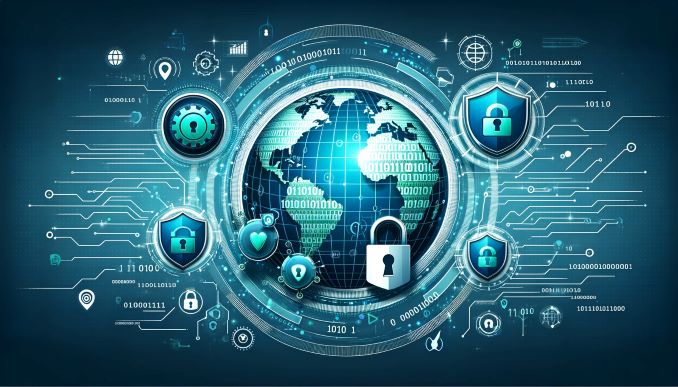What Is Cyber Security? And Why Does It Matter?

Introduction
What is cyber security? Fundamentally, it’s the safeguard for our digital systems, networks, and data against cyber threats, unauthorized access, and damage. In today’s digital age, where our daily lives and personal information increasingly move online, the importance of cyber security is undeniable. It acts as the guardian of our digital transactions, communications, and privacy from various cyber threats.
Cyber security isn’t solely for tech experts; rather, it’s a critical concern for everyone. However, simple, proactive measures can significantly enhance online safety. Adopting strong passwords, updating software regularly, and avoiding phishing emails are straightforward yet highly effective strategies.
Understanding Cyber Threats
Grasping the scope of cyber threats is vital for anyone navigating the digital world. Cyber threats aim to infiltrate, damage, or hijack your digital existence.
- Phishing: Attackers often send deceptive emails pretending to be from trusted entities to steal sensitive information. For example, an email that appears to be from your bank requesting account details is a classic phishing tactic.
- Malware and Ransomware: Malware may invade your system, causing unexpected pop-ups or slowing down your device, often setting the stage for more severe attacks. Conversely, ransomware, a type of malware, locks your files and demands a ransom for their release. Encountering inaccessible files along with a ransom note signals a ransomware attack.
- Identity Theft: It occurs when someone illegally obtains your personal information to commit fraud. Signs include unexplained bank transactions or unfamiliar accounts on your credit report.
Recognizing these threats is a crucial first step in strengthening your defenses against the myriad of cyber risks threatening our digital well-being.
Basic Cyber Security Concepts
Cyber security mirrors everyday personal hygiene and safety practices we follow in our daily lives. Just as we lock our doors at night or wash our hands to prevent illness, digital hygiene involves taking precautionary steps to protect our online spaces.
Furthermore, implementing basic cyber security measures, such as creating strong passwords, regularly updating software, and being cautious about the information we share online, is akin to practicing good hygiene. These simple yet effective actions are foundational in protecting ourselves against cyber threats.
Step-by-Step Guide to Enhancing Personal Cyber Security
Fortifying your digital life against cyber threats involves several steps:
Secure Your Devices
Begin with the basics: use strong, unique passwords for all devices and accounts. Additionally, use a password manager like Bitwarden for ease. Enable two-factor authentication (2FA) wherever possible for an extra layer of security. Regularly updating your software and operating systems is also critical, as these updates often include security patches for newly discovered vulnerabilities.
Safe Browsing Habits
Exercise caution while browsing the internet. Avoid unknown links or downloads, as they are common methods for spreading malware. Moreover, use reputable antivirus software like Bitdefender and engage in transactions only on secure (HTTPS) sites.
Protect Personal Information
Be mindful of the personal information you share online. Utilizing password managers to generate and store complex passwords greatly reduces the risk of unauthorized access to your accounts. This practice is crucial for securely managing your digital identity.
Email Security
Phishing attempts can be subtle, yet there are telltale signs to watch for. Scrutinize the sender’s email address for any anomalies and avoid clicking on suspicious links or attachments. Additionally, employ email filters and report any phishing attempts to enhance your defense.
Mobile Security
With smartphones becoming indispensable, mobile security is paramount. Only download apps from trusted sources like the App Store or Google Play, and be cautious with app permissions. Avoid using public Wi-Fi for sensitive transactions without a mobile VPN, such as NordVPN. Also, consider biometric security features for added protection and activate device finding services for lost or stolen devices.
Regular Monitoring and Backups
Stay vigilant by setting up alerts for unusual activity in your financial and personal accounts. Moreover, regular data backups ensure you can recover important information in case of a cyber incident.
Responding to Security Incidents
If you suspect your security has been compromised, act swiftly. Change your passwords immediately and contact your financial institutions to report potential fraud. Consequently, quick action can mitigate the damage and help secure your accounts.
By following these steps, you can significantly improve your cyber security posture, making it more challenging for cybercriminals to target you.
Cyber Security for Children and Teenagers: A Protective Guide
Educating the Young on Online Safety
- Awareness: Teach children and teenagers to recognize cyber threats, emphasizing the importance of online safety.
- Critical Thinking: Encourage them to question the authenticity of online content and interactions.
Open Communication
- Dialogue: Keep conversations about internet dangers and safe practices open.
- Guidance: Offer advice on safely navigating online challenges.
Engaging Resources for Learning
- Educational Tools: Provide young users with fun, engaging cyber security learning resources.
- Interactive Learning: Recommend educational websites, apps, and games for teaching digital literacy and safety.
Conclusion
Taking proactive cyber security steps empowers us to protect our online lives. Understanding and countering digital threats is crucial. However, cyber security is not a one-time task but an ongoing commitment, so staying informed through credible cyber security sources is essential for adapting to new threats. Continuous vigilance and learning are indispensable for maintaining digital safety.